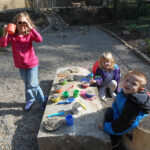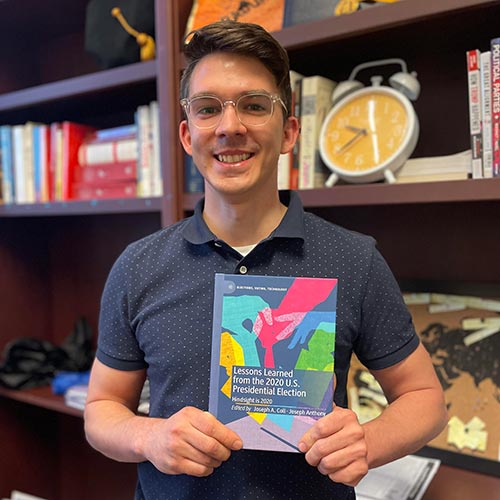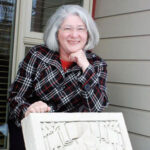
Political science professor publishes book providing insights from 2020 election

Joseph Coll, assistant professor of political science at The College of Wooster, recently published a book providing insights into the historic 2020 election, held during the height of the COVID-19 pandemic, offering best practices scholars and practitioners can turn to when similar challenges arise. Coll coedited Lessons Learned from the 2020 U.S. Presidential Election: Hindsight is 2020 along with Joseph Anthony, assistant professor of political science at State University of New York, after attending a conference in January 2022 with other political science scholars discussing the challenges of administering the election.
“We learned so much about how to operate elections during major pandemics, but just as important, it taught us about how to be adaptable in the election environment whenever these issues pop up,” Coll said, noting that the same insights can be applied not just to health crises but tornadoes, hurricanes, or other events that make it difficult to administer elections. “We know, for example, that if you change your polling site, you decrease how many poll workers are available, and you could really shutter voter turnout. We wrote the book specifically to explain the lessons we learned from the COVID pandemic but also to show how we can transfer these lessons to understanding how to administer elections when uncertainties arise.”
Contributing authors to the book address how states and localities altered their elections because of the pandemic, poll worker motivation for working during a health crisis, and how the changes to elections were viewed by election officials. Further, they examined how changes affected whether a citizen decided to cast a ballot, how they voted, and who they voted for, as well as how these changes influenced evaluations of the election, how long voters waited to cast a ballot, and how confident they were in the outcome. The culmination of the work educates scholars and practitioners about election administration, access, and evaluations from this historic election. For the project, Coll had the opportunity to learn about the publishing process and collaborate with senior scholars to share information about the various aspects of the election process that can affect voter access and voter confidence.
Increasing voter turnout through ballot drop boxes and the promotion and expansion of the ability to vote by mail apply not only when voters can’t get to the polls because of health concerns but could also be used in cases of areas affected by natural disasters or anything that prohibits people from voting in person. In his own chapter, Coll explained how electoral reforms like these “have the potential to reduce confidence in voting and the elections overall” in many years. “That’s really not what happened during the COVID pandemic though,” he said. “People recognized that policies were changed for legitimate reasons. They didn’t think it was partisan warfare. They thought it was trying to add access for those who have health disabilities.”
The changes that were made at polling locations also helped support voter confidence. “Policies that we use to protect voters in person, like cleaning your voting booth, social distance voting—these made people feel a lot safer. They also said that not only did they feel safer, but they thought poll workers performed better; they thought the polling places were better ran, and they had a more positive overall voting experience,” he said. “We can take that out of the COVID context and say, when you have these major issues arise, when you outfit your polling places to prevent any additional issues arising from that problem, you have the potential to make voters feel like the poll workers care more, and they’re trying harder to administer these elections.”
When teaching Wooster students, Coll emphasizes the importance of understanding the voting process and the complex details that go into administering elections. “We have very little understanding in the American public today about how elections are administered or the nuances thereof, and that’s what causes a lot of people to be less confident or think that elections are not legitimate,” he said. Coll calls attention to how elections operate and why they are structured certain ways. “Given that a lot of our students are young adults, just beginning their lives, it’s important to really give them the sense that these elections are secure,” said Coll.
Closing in on the end of his first semester at Wooster, Coll particularly enjoys his close work with students on research, including working with seniors on Independent Study to build their own interest in research. Additionally, he appreciates working closely with sophomore research assistants to offer perspective and support on his research about election policies, voter qualifications, voter confidence, and perceptions about electoral integrity. “I originally got interested in elections because I was wanted to see how we can design our election system to make sure that everybody has an equal access and equal voice in that system,” he said. “A lot of my research revolves around that idea of what are the policies we put in place for elections and how they affect how people access elections.”
Posted in Faculty, News on April 25, 2024.
Related Posts
Related Areas of Study
Political Science
The study of power, with concentrations in U.S. politics, international relations, political theory and comparative politics.
Major Minor

